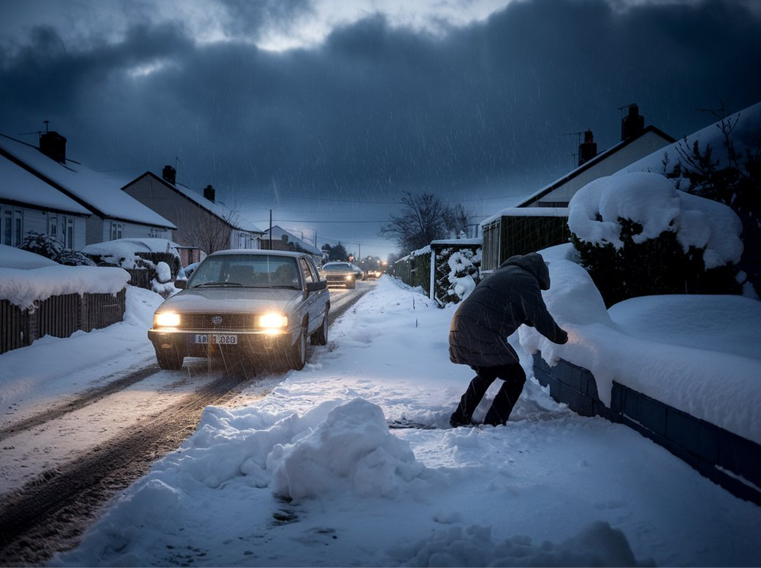From artisanal crepes to rebellious cheesecake waffles, Reading's breakfast rebels are transforming morning meals. These seven spots will revolutionize how you start your day.
Britons are bracing for a frosty weekend as the Met Office raises the alarm with a yellow weather warning for heavy snow. The national forecaster cautions that significant snowfall could wreak havoc across the country, potentially disrupting travel plans and daily routines. This unseasonable weather event, occurring in early January 2025, serves as a stark reminder of the UK's increasingly unpredictable climate patterns. As communities prepare for the impending white blanket, questions arise about the nation's readiness to cope with extreme winter conditions in an era of climate change.
Met Office Issues Yellow Warning for Heavy Snow

The Met Office has raised concerns for the upcoming weekend by issuing a yellow weather warning for heavy snow across the United Kingdom. This alert, released on 2nd January 2025, signals the potential for significant disruption to daily life and travel plans as a blanket of snow is expected to cover large swathes of the country.
The national weather service emphasises that the snowfall could be particularly heavy in some areas, leading to challenging conditions on roads and railways. Motorists are advised to exercise caution and prepare for possible delays or cancellations to their journeys. Public transport users may also face disruptions, with bus and train services potentially affected by the adverse weather.
While the exact amount of snowfall remains uncertain, meteorologists predict that some regions could see accumulations of several centimetres, especially in higher elevation areas. The yellow warning serves as an early alert for residents and local authorities to begin preparations for the wintry conditions.
Danny Lawson, a Met Office spokesperson, stated, "We're urging the public to stay informed about the latest forecasts and to be prepared for changing weather conditions. This unseasonable snowfall in early January could catch many off guard, so it's crucial that people plan accordingly."
Community Impact and Climate Considerations
The impending snowfall raises questions about the UK's readiness to handle extreme winter weather in the face of changing climate patterns. Local councils are likely to mobilise gritting teams and snow ploughs to keep primary roads clear, but smaller communities may face challenges in maintaining accessibility.
This weather event could have far-reaching effects on various sectors. Retailers may see a surge in demand for winter essentials, while the hospitality industry could experience a downturn as people opt to stay indoors. Schools may need to consider closure or remote learning options if the snowfall is particularly severe.
The timing of this heavy snow warning, coming just after the New Year celebrations, could disrupt post-holiday travel plans for many families returning from winter breaks. It also poses a potential risk to vulnerable populations, particularly the elderly and those with mobility issues, who may struggle with the icy conditions.
Climate experts are likely to scrutinise this event as part of the broader pattern of increasingly unpredictable weather in the UK. While heavy snow in January is not unprecedented, the intensity and widespread nature of this forecast raise questions about the long-term trends in British winter weather and the need for enhanced infrastructure resilience.
As communities brace for the snow, there's an opportunity for increased neighbourhood cooperation, with local support networks potentially activating to assist those most affected by the adverse conditions. This weather warning serves as a reminder of the importance of community preparedness and adaptability in the face of nature's challenges.
A Nation on Ice: Navigating the Snowfall's Broader Impact
As the UK braces for an unseasonable blanket of snow, this weather event serves as more than just a temporary inconvenience. It's a stark reminder of our changing climate and the need for adaptive strategies in the face of increasingly unpredictable weather patterns.
The impending snowfall presents both challenges and opportunities. While travel disruptions and potential risks to vulnerable populations are immediate concerns, this event also offers a chance for communities to demonstrate resilience and solidarity. Local support networks may spring into action, showcasing the strength of neighbourhood bonds in times of adversity.
For businesses, particularly those in retail and emergency services, this weather warning signals a need for agility. How will companies adapt their operations to meet sudden shifts in demand or accessibility? The ability to pivot quickly in response to extreme weather events may become a crucial factor in business resilience.
Moreover, this snow warning raises important questions about infrastructure and urban planning. Are our cities and towns equipped to handle more frequent extreme weather events? This could be a catalyst for discussions on climate-resilient urban design and the allocation of resources for winter preparedness.
As we contemplate the broader implications of this snowfall, we must ask ourselves: How can we, as individuals and communities, better prepare for and adapt to a future where such 'unusual' weather events become increasingly common? The answer may lie in fostering a culture of preparedness, community support, and sustainable living practices.